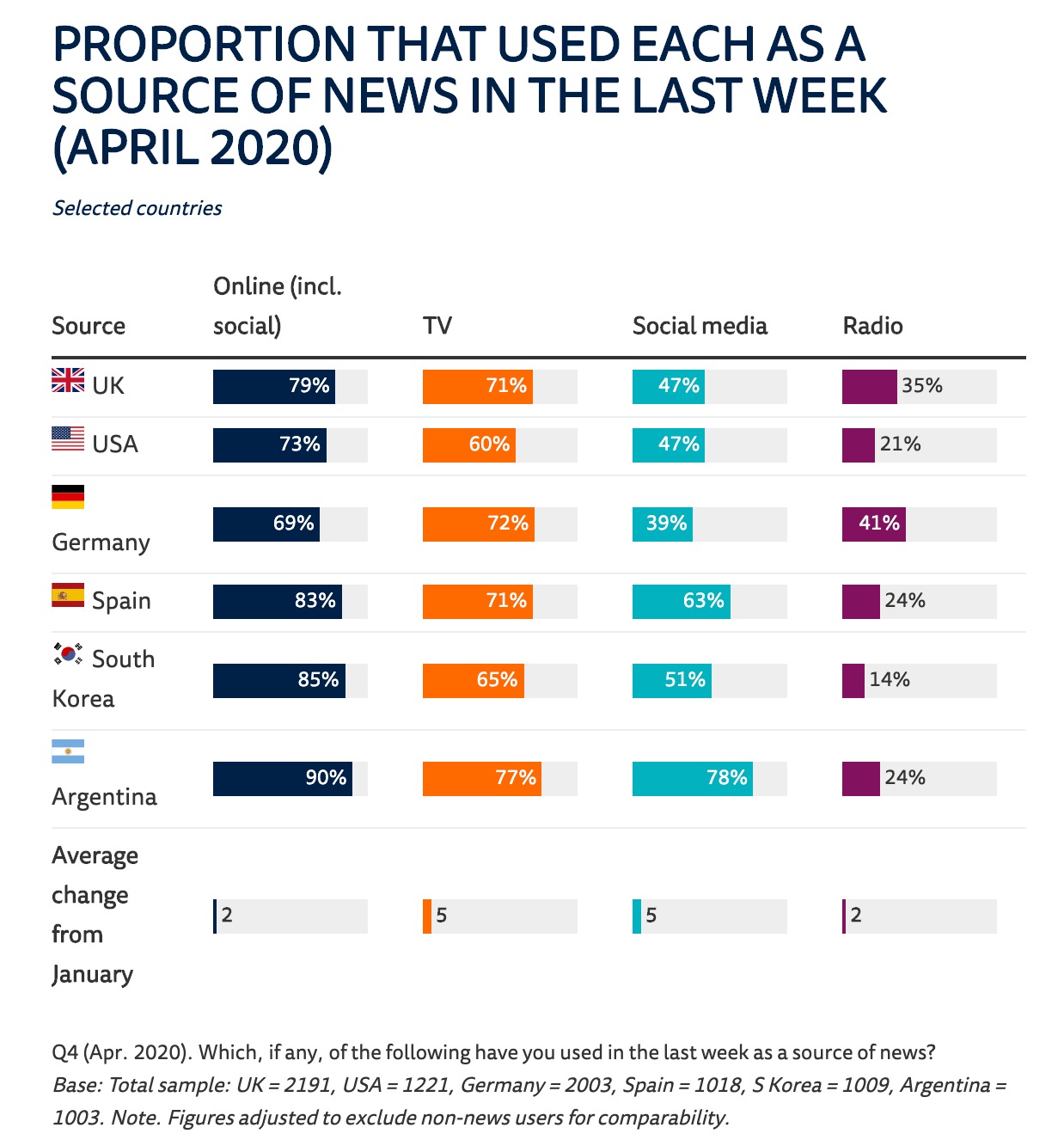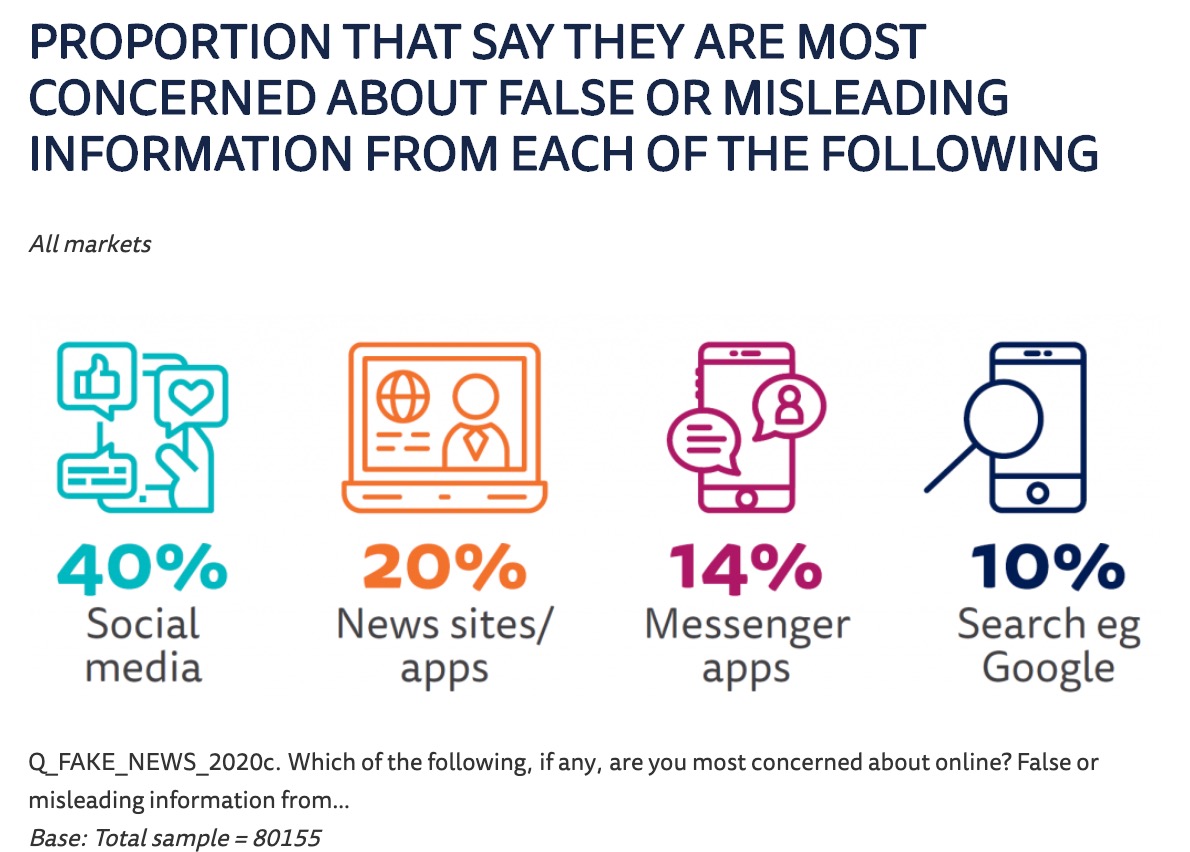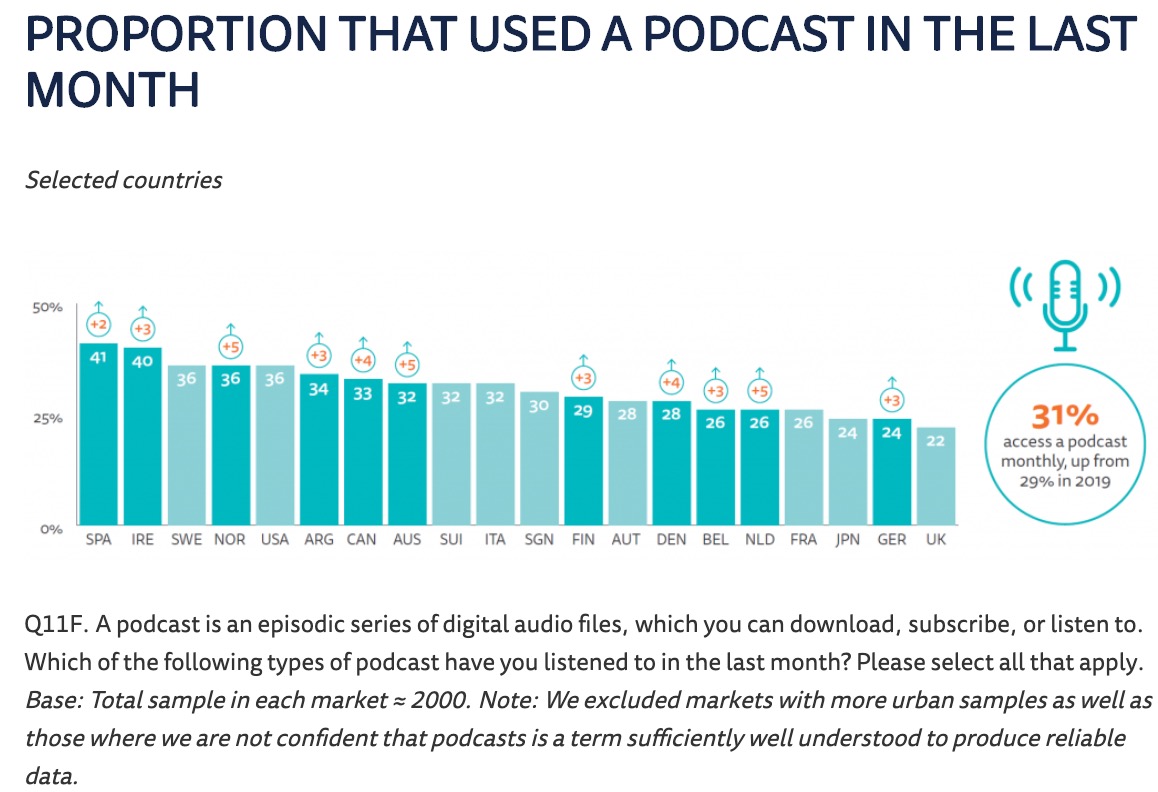Reuters Institute for the Study of Journalism Releases “Digital News Report 2020”
From the Summary/Key Findings Section of the Report:
Much of the data in this publication was collected before the virus hit many of the countries featured in this survey, so to a large extent this represents a snapshot of these historic trends. But to get a sense of what has changed, we repeated key parts of our survey in six countries (UK, USA, Germany, Spain, South Korea, and Argentina) in early April. These responses confirm industry data which show increased consumption of traditional sources of news, especially television, but also some online news sources.
- [Emphasis Ours] The coronavirus crisis has substantially increased news consumption for mainstream media in all of the countries where we conducted surveys before and after the pandemic had taken effect. Television news and online sources have seen significant upticks, and more people identify television as their main source of news, providing temporary respite from a picture of steady decline. Consumption of printed newspapers, has fallen as lockdowns undermine physical distribution, almost certainly accelerating the shift to an all-digital future.
- At the same time, the use of online and social media substantially increased in most countries. WhatsApp saw the biggest growth in general with increases of around ten percentage points in some countries, while more than half of those surveyed (51%) used some kind of open or closed online group to connect, share information, or take part in a local support network.
- As of April 2020, trust in the media’s coverage of COVID-19 was relatively high in all countries, at a similar level to national governments and significantly higher than for individual politicians. Media trust was more than twice the level for social networks, video platforms, or messaging services when it came to information about COVID-19.
From our wider dataset collected in January:
- Global concerns about misinformation remain high. Even before the coronavirus crisis hit, more than half of our global sample said they were concerned about what is true or false on the internet when it comes to news. Domestic politicians are the single most frequently named source of misinformation, though in some countries – including the United States – people who self-identify as right-wing are more likely to blame the media – part of a pick-your-side Facebook is seen as the main channel for spreading false information almost everywhere but WhatsApp is seen as more responsible in parts of the Global South such as Brazil and Malaysia.
- In our January poll across countries, less than four in ten (38%) said they trust most news most of the time – a fall of four percentage points from 2019. Less than half (46%) said they trust the news they use themselves. Political polarisation linked to rising uncertainty seems to have undermined trust in public broadcasters in particular, which are losing support from political partisans from both the right and the left.
- Despite this, our survey shows that the majority (60%) still prefer news that has no particular point of view and that only a minority (28%) prefer news that shares or reinforces their views. Partisan preferences have slightly increased in the United States since we last asked this question in 2013 but even here a silent majority seems to be looking for news that at least tries to be objective.
- As the news media adapt to changing styles of political communication, most people (52%) would prefer them to prominently report false statements from politicians rather than not emphasise them (29%). People are less comfortable with political adverts via search engines and social media than they are with political adverts on TV, and most people (58%) would prefer platforms to block adverts that could contain inaccurate claims – even if it means they ultimately get to decide what is true.
- We have seen significant increases in payment for online news in a number of countries including the United States 20% (+4) and Norway 42% (+8), with smaller rises in a range of other markets. It is important to note that across all countries most people are still not paying for online news, even if some publishers have since reported a ‘coronavirus bump’.
- Overall, the most important factor for those who subscribe is the distinctiveness and quality of the content. Subscribers believe they are getting better information. However, a large number of people are perfectly content with the news they can access for free and we observe a very high proportion of non-subscribers (40% in the USA and 50% in the UK) who say that nothing could persuade them to pay.
[Clip]
- The proportion using podcasts has grown significantly in the last year, though coronavirus lockdowns may have temporarily reversed this trend. Across countries, half of all respondents (50%) say that podcasts provide more depth and understanding than other types of media. Meanwhile, Spotify has become the number one destination for podcasts in a number of markets, overtaking Apple’s podcast app.
- Overall, almost seven in ten (69%) think climate change is a serious problem, but in the United States, Sweden, and Australia a significant minority dispute this. This group tends to be right-wing and older. Younger groups access much of their climate change news from social media and by following activists like Greta Thunberg.
- Voice-activated smart speakers like the Amazon Echo and Google Home continue to grow rapidly. Usage for any purpose has risen from 14% to 19% in the UK, from 7% to 12% in Germany, and 9% to 13% in South Korea. Despite this, we find that usage for news remains low in all markets.
Report Resources
- D
- Download the Report
112 pages; PDF. - Data Interactive
- Data by Country
- Report in 200 Slides
- First Episode of Podcast
Filed under: Companies (Publishers/Vendors), Data Files, News, Podcasts
About Gary Price
Gary Price (gprice@gmail.com) is a librarian, writer, consultant, and frequent conference speaker based in the Washington D.C. metro area. He earned his MLIS degree from Wayne State University in Detroit. Price has won several awards including the SLA Innovations in Technology Award and Alumnus of the Year from the Wayne St. University Library and Information Science Program. From 2006-2009 he was Director of Online Information Services at Ask.com.





